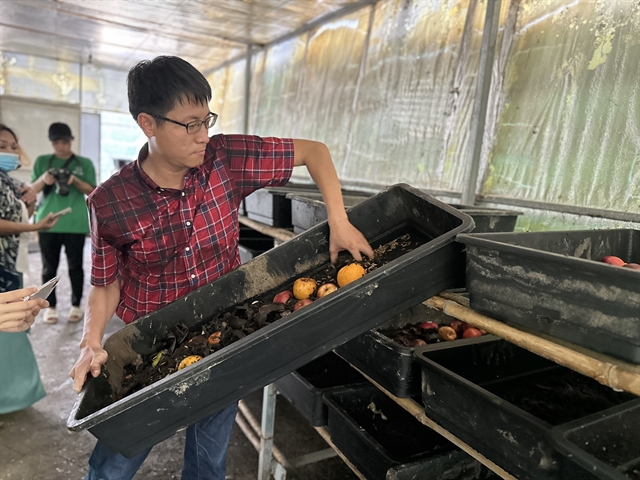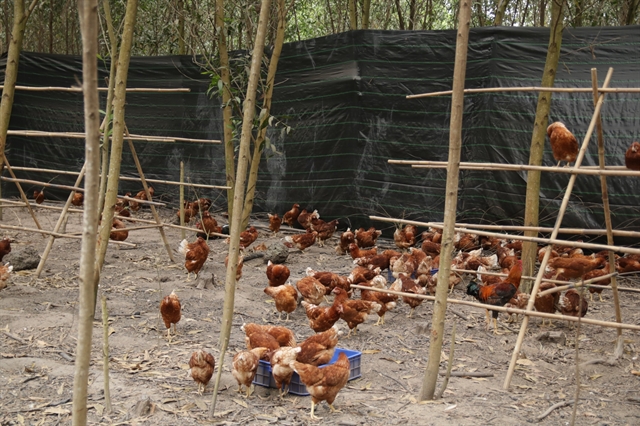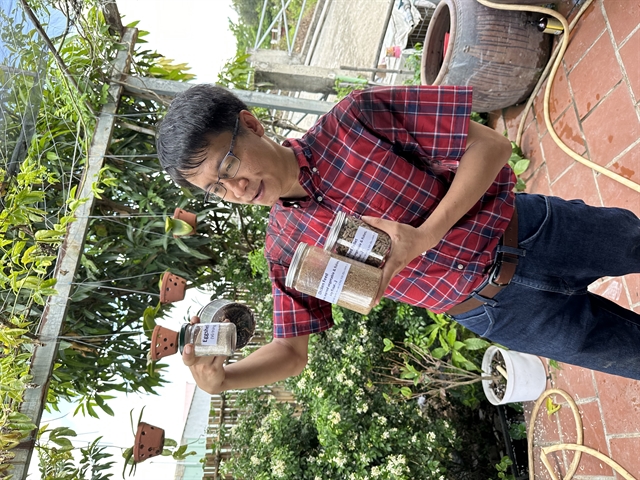Being a Harvard graduate but quitting high-salary jobs in big companies to follow his dream of raising black soldier fly larvae to feed free-range chickens, Huỳnh Hạnh Phúc has been recently famous for his plans to bring positive changes in society. Currently he joins the circular economy that many companies are following. Việt Nam News reporter Thu Ngân talks with Phúc, 36, about his dreams and future plans.
Inner Sanctum: Can you please tell us about yourself?
My name is Huỳnh Hạnh Phúc, CEO and founder of Green Connect. I am always passionate about solving pressing issues facing Việt Nam such as education inequity, environmental degradation, and pesticide overuse in agriculture.
I am so curious about how they have happened for years and how to find ways to overturn outdated traditions and conventions. For example, Việt Nam is poor, but ranks the second in food waste in the Asia-Pacific region, surpassing many rich countries.

Huỳnh Hạnh Phúc at one of his farms raising black soldier fly larvae. — VNS Photos Thu Ngân
Inner Sanctum: You once worked with high salaries for some big companies. Why did you quit those jobs?
Earning high salaries is the dream of many youths. I used to believe that earning high salaries made me happy in life, but it turned out insufficient. I realised that living a life full of values, of commitment, a life to solve some urgent and pressing problems for society, brought me greater joy and meaning.
Sometimes, I feel enlightened when I ride my bicycle for several hours and stop for a rest to drink sugarcane juice on the street, and lie down on a hammock. I reflect about the over-consumption trend facing society, “we eat more food but we get less from it”, “we have more technology but we over rely on it and become addicted to it”, and the never ceasing work-life balance battle in the brain.
I contemplated about the value compass in me several times when I worked for big tech startups whose values contradicted mine so much. I shared my concerns with my wife and my mom, and then from scratch I started my social enterprise committed to solving problems as first priority, but with a sustainable business model balancing between social and environment impact and profitability.
Inner Sanctum: Would you please tell us about your projects?
We are trying to change awareness of communities about waste. In fact, I believe “one man’s trash is another man’s treasure”.
More than that, current logistics and infrastructure make it impossible to realise the treasure. It is designed for the last century, the traditional linear extract-produce-use-dump material and energy flow that no longer fits the circular economy any more.
To put it simply, we make the journey from waste to table possible by reinventing waste management and treatment using various methods from logistics, to biotechnologies, to digital technologies via our project Larva Yum.
We have an e-commerce platform called NODA to sell these products and products of several farmers who are committed to applying natural agricultural methods to farming.
We also create several campaigns via our app GreenPoints to help communities live green via gamification by taking green actions every day to receive points, and using points to donate to forest planting campaigns, and match the donation with real money from sponsors. Green actions can be segregating waste, taking a bicycle to work, or going veggie for a day.
Inner Sanctum: What inspired you to develop this Green Connect project and what are your memories of the earliest days of developing it?
The inefficiency of the current value chains makes a lot of materials become waste instead of resources. I was taught from my childhood by my family to respect food, to protect resources on earth because they are limited.
Sometimes the work we are doing is very smelly. I still remember the time in April 2023 when our team and I for the first time dipped our feet and hands in a pond of duck manure dumped by a very big duck farm, filtering the black soldier fly larvae out the manure from which the larvae ate.
We were shocked to realise that duck manure and waste water was dumped into a local stream, polluting the environment for several years, but still no actions from anyone. This practice is rampant in Việt Nam. By the way, duck manure is good compost, if managed and treated properly.
Inner Sanctum: How has the project fared?
The project started in March 2022, from a small facility in District 12 in HCM City, processing 200-300kg of waste a day by applying black soldier fly larvae (BSFL) treatment. Then we started to introduce raising chickens to eat these BSFL.
In July 2022, the project discussed with Mondelez Kinh Đô with a bold idea of “from waste to organic chickens and eggs” and finally received a US$30,000 strategic grant to implement the model, raising more than 1,500 chickens in the canopy of Vĩnh Cửu acacia forest.
We then expanded the facility to Nhơn Trạch District in Đồng Nai Province in March 2023, increasing our treatment capacity to 1.5 tonnes per day, and will soon increase it several folds under the cooperation business model with several agricultural cooperatives across Việt Nam. We are expanding to Hà Tĩnh, Hà Nội and Đà Nẵng.
So far, more than 1,000 tonnes of organic waste, and more than 5 tonnes of plastic and glass bottles have been processed.

Phúc’s facility raising free range chickens. — Photo courtesy of Green Connect
Inner Sanctum: You have joined hands with other companies to pursue circular economy projects. Can you tell us something about that and what are the difficulties in implementing them?
The project now is working with several big businesses to help them manage waste better. For example, we are working with Mondelez Kinh Đô, the biggest snack company, Mega Market, one of the biggest supermarket chains, Pizza Hut, Pizza 4Ps, the biggest pizza retailers in Việt Nam.
We became their strategic partners, helping them save costs, protect the environment, train their employees to live green, to design greener office corners, and together celebrate success toward circular economy transition. We help them find ways for the waste, from organic waste, to plastic, and glass bottles.

Phúc introduces products at his farm.
Inner Sanctum: Do you have any plans for the future and how do you plan to achieve them?
I want to connect all supply of waste and demand for waste together, so that no resource will be wasted. That is also the meaning of the name of our company Green Connect.
In order to do so, Green Connect has to set up some core structures and platforms for cooperation, devising alternative methods to make possible the flow of materials from where it is dumped to where it is needed.
Above all, all stakeholders must agree on the new shared values, the three-pronged people, planet, and profit. VNS
OVietnam